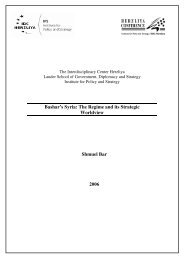Iran: Cultural Values, Self images and Negotiation Behavior
Iran: Cultural Values, Self images and Negotiation Behavior
Iran: Cultural Values, Self images and Negotiation Behavior
Create successful ePaper yourself
Turn your PDF publications into a flip-book with our unique Google optimized e-Paper software.
Abstract<strong>Iran</strong> holds a unique place in the study of the modern Middle East: it is a non-Arabcountry, but deeply involved in the heart of the Arab world; after the removal ofSaddam Hussein <strong>and</strong> the “repentance” of Mu’amar Qaddafi, it remains the onlyovertly radical state in the region with a proclaimed ideological anti-Americanagenda; it is the sole Shiite regime <strong>and</strong> the active “exporter” of Islamic radicalism <strong>and</strong>terrorism, not only to Shiite, but also to Sunnite Islamic movements; <strong>and</strong> it is activelyinvolved in attempts to disrupt the Israeli-Arab peace process. Above all of these, <strong>Iran</strong>is worthy of special interest as a regional power capable of creating high levels oftension in the sensitive area of the Persian Gulf, <strong>and</strong> as a country with an advancedcl<strong>and</strong>estine nuclear weapons program.Current negotiations with <strong>Iran</strong> on these issues warrant an effort to decipher the<strong>Iran</strong>ian negotiation code. This study attempts to do so by analysis of key elements of<strong>Iran</strong>ian worldviews, beliefs, mores, communication conventions, social behavior,cultural, linguistic, <strong>and</strong> social heritage <strong>and</strong> culture-dependent bargaining norms thatthe well acculturated <strong>and</strong> socialized <strong>Iran</strong>ian would perceive as comprising those traitsof <strong>Iran</strong>ian “national character” (with all the caveats due to such a concept) whichmay affect <strong>Iran</strong>ian negotiation tactics.<strong>Iran</strong>’s interaction with its neighbors <strong>and</strong> other nations is, first <strong>and</strong> foremost,influenced by a constant tension between Persian <strong>and</strong> Islamic identities <strong>and</strong>between conflicting self–<strong>images</strong> of national superiority <strong>and</strong> subjugation. On oneh<strong>and</strong>, it bases its claim for predominance in the Middle East on a highly accentuatedIslamic-Shiite identity. On the other h<strong>and</strong>, <strong>Iran</strong>ian nationalism is highly exclusive.While <strong>Iran</strong>ians identify pro forma with Muslims in general <strong>and</strong> Shiites in particular,the scope of <strong>Iran</strong>ian national identity remains that of the Persian-speaking Shiiteswithin the borders of <strong>Iran</strong>, <strong>and</strong> <strong>Iran</strong>ian expatriates. Furthermore, <strong>Iran</strong>ian nationalidentity projects a sense of superiority towards its Arab neighbors <strong>and</strong> pride of its pre-Islamic imperial past. For <strong>Iran</strong>ians, all that was great in what is commonly referred toas Islamic or Arab culture was actually Persian. This self-image even holds certainracial overtones: it links <strong>Iran</strong> to a primordial “Aryan” world of settled civilization, farsuperior to the "primitive" nomadic Arabian culture, but at the same time, one that hasbeen conquered, <strong>and</strong> humiliated by outside forces.Similar contradictions exists in the <strong>Iran</strong>ian attitude towards the West <strong>and</strong> itsculture; a mixture of admiration for its achievements in the very areas which <strong>Iran</strong>ianculture prides itself (science <strong>and</strong> arts) along with rejection of its cultural sway <strong>and</strong> itspervasive influence within <strong>Iran</strong>ian society <strong>and</strong> a sense of having been victimized <strong>and</strong>sidelined by the West. It is this very admiration, however, that brought <strong>Iran</strong>iannationalist intellectuals to liken <strong>Iran</strong>ian civilization to a body that is affected by apoison or virus of the West (gharb-zadeggi or "Westoxicated"). The <strong>Iran</strong>ian attitudetowards Israel <strong>and</strong> the Jews is also a mixture of religious <strong>and</strong> ethnic animosity <strong>and</strong>of admiration.These perceptions have contributed to a tendency in <strong>Iran</strong>ian political thinkingtowards conspiracy theories, which attribute the course of contemporary <strong>Iran</strong>iani
















